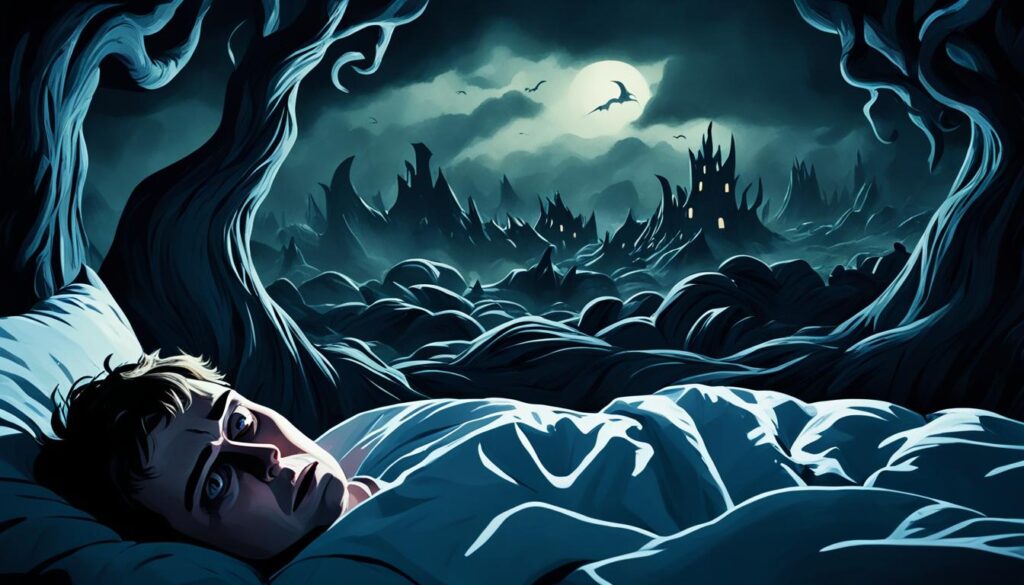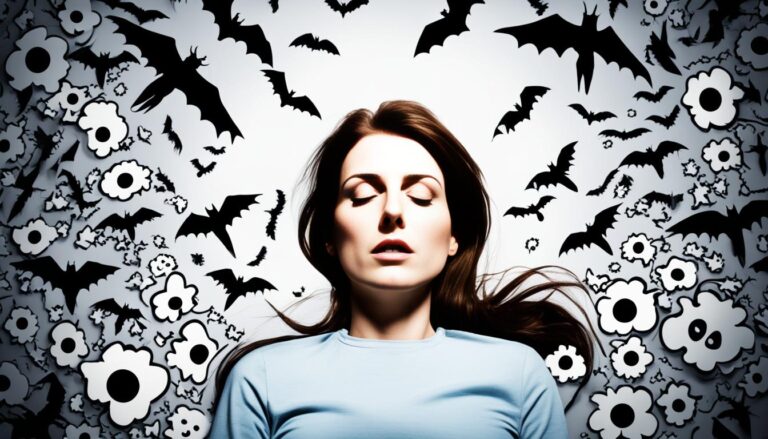Nightmares are vivid dreams that can disrupt sleep and affect many people. About half of all adults have nightmares sometimes, and 2% to 8% have them often. These dreams usually happen during rapid eye movement (REM) sleep.
The causes of nightmares vary widely. They can come from eating too much before bed, some medicines, or even anxiety and depression. Sleep issues like sleep apnea can also cause nightmares.
Nightmares can lead to sleep deprivation, which can cause more serious health problems. But, there are ways to cope with them. Changing your behavior can help 70% of adults who have nightmares.
Therapy like imagery rehearsal treatment can also help. It’s especially useful for people with PTSD who have frequent nightmares. By understanding what causes nightmares and how to deal with them, we can start to overcome this sleep issue.
Key Takeaways
- One in two adults occasionally experiences nightmares, highlighting their commonality.
- Nightmares, affecting 2% to 8% of adults, typically occur during REM sleep.
- Causes include anxiety, PTSD, sleep deprivation, and certain medications.
- Coping strategies, like behavioral changes, have proven effective for many individuals.
- Imagery rehearsal treatment shows promise for treating recurrent nightmares.
- Maintaining good sleep hygiene can significantly reduce nightmare frequency.
What Are Nightmares?
Nightmares are intense dreams that make people feel scared, anxious, or upset. They happen during REM sleep and can really mess with your sleep and mood.
Definition and Characteristics
Nightmares have vivid and scary images and make people feel strong emotions. People wake up remembering the dream’s details, like what happened and how they felt. These dreams can make you feel bad even after you wake up.
Common Themes in Nightmares
Many nightmares involve falling, being chased, or facing danger. These themes tap into our deep fears. For adults, they might come from past traumas or current worries. Kids often dream about things they’re scared of because of their growth and experiences.
| Common Themes | Description |
|---|---|
| Falling | A sensation of losing control, often resulting in a startling awakening. |
| Being Chased | Represents feelings of anxiety or avoidance, revealing unresolved conflicts. |
| Facing Danger | Involves confrontations with threatening scenarios, highlighting fears or insecurities. |
| Trapped or Isolated | Symbolizes feelings of helplessness or emotional entrapment in waking life. |
Understanding the Science of Nightmares
Nightmares are a key part of sleep science, especially tied to REM sleep. This sleep stage is when the brain is most active, leading to vivid dreams and sometimes scary nightmares. Learning how REM sleep and nightmares are connected helps us understand these unsettling dreams better.
The Role of REM Sleep
REM sleep starts about 90 minutes after you fall asleep. It’s when most dreaming happens, giving people a mix of emotional and sensory experiences. Studies show that 2%-8% of adults have nightmares often, which can ruin their sleep. For college students, this number jumps to 47%, showing how common nightmares can be.
Physiological Reactions During Nightmares
During a nightmare, the body shows strong physiological reactions in nightmares. You might feel your heart racing, breathe fast, or sweat a lot. These feelings mimic real danger, using the body’s fight-or-flight response. Nightmares can also make you feel anxious and keep you awake, adding to the distress.
It’s important to grasp these points to see how nightmares affect our mental health. For people with PTSD or chronic anxiety, nightmares can start a cycle of sleep problems that needs attention.
Nightmares: Causes, Effects, and Coping Strategies
Nightmares can be scary and affect many parts of life. About 2-6% of adults have nightmares every week. Women and young girls often have more nightmares than men. In kids aged 3 to 6, nightmares are especially common, but they usually get less frequent as they get older.
There are many reasons why people have nightmares. Stress and mental health issues are big ones. For example, stress from arguments, school pressure, or big life changes can lead to nightmares. People with PTSD often have nightmares too, affecting 50-90% of them. Stress, sleep problems, and not knowing how to deal with stress can make nightmares worse.
Nightmares can do more than just disrupt sleep. They can make people feel bad mentally and emotionally. Bad sleep quality can make you feel tired, anxious, and less able to do things. People with nightmares might feel more emotional and find it hard to handle everyday tasks.
To deal with nightmares, we need to find the right ways to cope. Doing relaxing things before bed can help reduce anxiety that leads to nightmares. Imagery Rehearsal Therapy and Cognitive Behavioral Therapy (CBT) are good at changing negative thoughts and nightmares. Knowing what triggers nightmares and using these strategies can improve sleep and mental health.
The Different Types of Nightmares
Nightmares show up in different ways across various ages. Each type mirrors the mental and emotional state of the person. Knowing the differences between Childhood Nightmares, Adult Nightmares, and Nightmare Disorders helps people understand their dreams better. It also helps them find the right support.
Childhood Nightmares
About 20 to 39 percent of kids aged 5 to 12 have nightmares. These dreams often feature fears like monsters, dark places, or being left alone. Kids have vivid dreams that can make them scared of sleeping. Parents should know this is normal and offer comfort.
Adult Nightmares
Adults often have nightmares with complex stories tied to their problems or stress. Around 5 to 8 percent of adults deal with nightmares that can be linked to anxiety, depression, or past traumas. These nightmares can make it hard to sleep well and can increase anxiety about sleeping. Dealing with stress in daily life might reduce the number of nightmares.
Nightmare Disorders
Nightmare Disorders are when nightmares happen a lot and really bother someone, making it hard to live normally. Doctors look at how often and how nightmares affect someone’s life to diagnose this. These nightmares might show deep emotional or past trauma. Getting help through therapy can be key to overcoming these disorders. This can help people take back control of their sleep and mental health.
| Type of Nightmare | Prevalence | Common Themes | Treatment Approaches |
|---|---|---|---|
| Childhood Nightmares | 20-39% in ages 5-12 | Monsters, dark places, abandonment | Reassurance, comfort |
| Adult Nightmares | 5-8% of adults | Anxiety, unresolved issues, trauma | Stress management, therapy |
| Nightmare Disorders | Varied prevalence rates | Recurrent, distressing dreams | Trauma-focused therapy |
Common Causes of Nightmares
Nightmares can come from many sources, both mental and physical. Knowing what causes nightmares can help people find ways to deal with them. Trauma, anxiety, depression, and sleep issues are big factors.
Trauma and PTSD
Trauma often leads to nightmares. People who have gone through tough times may see those memories in their dreams. Studies show that 80% of those with PTSD have nightmares tied to their past.
This shows how big an effect trauma can have on sleep and nightmares.
Anxiety and Depression
Anxiety and depression can make sleep worse, leading to scary dreams. These conditions make it easy for dreams to turn into nightmares. They also mess with sleep patterns.
People with anxiety might find it hard to relax at night, making sleep poor.
Sleep Disturbances
Bad sleep habits and substance use can make nightmares worse. Good sleep habits are key to fewer nightmares. A calming bedtime routine can help improve sleep and cut down on nightmares.
| Cause | Impact on Nightmares | Frequency of Occurrence |
|---|---|---|
| Trauma and PTSD | Memory resurfacing during sleep | 80% in individuals with PTSD |
| Anxiety and Depression | Exacerbation of sleep disturbances | Common in affected individuals |
| Sleep Disturbances | Disrupted sleeping patterns contribute | Directly correlates with nightmare frequency |
Psychological Effects of Nightmares
Nightmares can deeply affect our minds, even after we wake up. These scary dreams can make it hard to handle daily tasks. They can also hurt our mental health. It’s important to understand how nightmares affect our daily life and mental health.
Impact on Daily Life
Nightmares can really change how we live our lives. They make us feel anxious and scared of sleep. This leads to poor sleep and feeling tired all day.
This cycle can cause:
- Increased daytime sleepiness
- Impaired cognitive functions, including memory and concentration
- Withdrawal from social activities due to exhaustion
- Difficulty with emotional regulation and decision-making
Bad sleep from nightmares can hurt our physical and mental health. It can lead to insomnia, making things even worse.
Relationship Between Nightmares and Mental Health
Nightmares and mental health are closely linked. People with mental health issues like PTSD often have more nightmares. These nightmares can make them feel hopeless and helpless.
Conditions like anxiety and depression can get worse because of nightmares. Disrupted sleep can also hurt our thinking skills. This makes it hard to remember things.
Bad sleep from nightmares can make depression symptoms worse. This shows how nightmares and poor sleep can affect each other. The effects of nightmares can really lower our quality of life.

Physical Effects of Nightmares
Nightmares can cause more than just trouble sleeping. They can really affect your health. When you have nightmares, you might not sleep well, which can make daily life hard. People who have nightmares often struggle to get good sleep, which makes their health problems worse.
Disruption of Sleep Hygiene
Nightmares can mess up your sleep habits. This means you might feel tired and have trouble focusing during the day. As nightmares happen more often, you might start napping or staying up late to avoid sleep. This can mess up your body’s natural sleep cycle and cause problems like:
- Chronic fatigue
- Increased anxiety levels
- Reduced cognitive function
To fix these problems, it’s important to find out what triggers your nightmares. Trying things like relaxing before bed or making your bedroom calm can help. Learning how to handle anxiety linked to health issues can also improve your sleep.
Long-term Health Risks
Nightmares can lead to serious health issues over time. They can cause problems like obesity, heart disease, and chronic insomnia. The cycle of poor sleep from nightmares can make health problems worse, causing more stress.
| Health Risk | Impact on Health |
|---|---|
| Obesity | Disrupted sleep can affect metabolism and appetite regulation. |
| Heart Disease | Increased stress from sleep deprivation can elevate blood pressure. |
| Chronic Insomnia | Recurring nightmares heighten the risk of developing long-term sleeping disorders. |
People who have nightmares often face mental health challenges too. It’s key to deal with the physical effects of nightmares to avoid long-term health problems. Improving sleep and finding what triggers nightmares can lead to better health and happiness.
Coping Strategies for Nightmares
Coping with nightmares can make sleep better and improve how you feel. There are many ways to deal with them. These include behavioral techniques, imagery rehearsal therapy, and cognitive behavioral therapy. Each method helps lessen the impact of nightmares.
Behavioral Techniques
Behavioral techniques help make bedtime calming. This means setting up a relaxing bedtime routine. Here are some ways to do this:
- Setting a consistent sleep schedule
- Avoiding stimulants before bedtime
- Engaging in calming activities, such as reading or using guided meditation
Using these techniques can make bedtime peaceful. This leads to better sleep and fewer nightmares.
Imagery Rehearsal Therapy
Imagery rehearsal therapy is great for cutting down on nightmares. It lets you change scary dreams into better ones. By practicing these new dream scenarios, nightmares become less scary.
Adding creative activities like painting, sketching, or writing can help too. They let you express your fears in a new way.
Cognitive Behavioral Therapy (CBT)
Cognitive behavioral therapy helps with nightmares by focusing on thoughts and actions. It teaches you to spot and change negative thoughts. This way, you learn to handle your anxiety about nightmares better. CBT offers lasting relief and makes you stronger against nightmares.
| Strategy | Description | Effectiveness |
|---|---|---|
| Behavioral Techniques | Establish a calming nightly routine to promote relaxation before sleep. | High |
| Imagery Rehearsal Therapy | Actively rewrite nightmares with positive endings to reduce their negative impact. | Very High |
| Cognitive Behavioral Therapy (CBT) | Focus on recognizing and restructuring thoughts related to nightmares for lasting relief. | High |
Sleep Hygiene Tips to Reduce Nightmares
Good sleep habits are key to fewer nightmares and better sleep. By making your sleep area calm and sticking to a regular sleep schedule, you can cut down on scary dreams.
Creating a Calming Sleep Environment
Creating a peaceful sleep space is crucial for better sleep. Here are some tips:
- Use white noise machines or earplugs to lower noise levels.
- Ensure your bedroom is dark and cool to help you relax.
- Choose a mattress and pillows that feel right for you.
- Avoid screens for an hour before bed to prevent sleep issues.
- Add soft lighting, calming smells, and cozy bedding for a soothing atmosphere.
The Importance of a Consistent Sleep Schedule
Keeping a regular sleep schedule is key for good sleep habits. A steady routine helps your body clock work better, which means fewer nightmares. Here’s how to keep a consistent sleep schedule:
- Always go to bed and wake up at the same time, even on weekends.
- Don’t take long naps during the day to avoid sleep problems at night.
- Do relaxing activities before bed, like reading or a warm bath.
- Watch how much caffeine and alcohol you drink, as they can affect sleep.
- Write in a journal before bed to clear your mind and ease anxiety.
When to Seek Professional Help
Nightmares can really affect how we feel inside. If you keep having trouble with nightmares, it’s time to get help. Knowing the nightmare disorder signs is key to fixing the problem. If you wake up a lot, feel anxious before bed, or fear sleeping, you might need help from experts.
Signs of Nightmare Disorder
Spotting the signs of nightmare disorders is the first step to getting better. Look out for these signs:
- Regularly experiencing distressing dreams that cause waking up during the night
- Intense feelings of fear or anxiety upon waking from a nightmare
- Difficulty going back to sleep after a nightmare
- Daytime fatigue or sleep disturbances impacting daily activities
- Consistent worries or fears associated with dreaming or sleeping
Ignoring these nightmare disorder signs can make things worse. It might lead to more anxiety or depression. Learning how to cope with emotions can help manage your symptoms.
Types of Professionals Who Can Help
When you’re looking for seeking professional help, there are many experts who can assist. Here are some:
| Professional Title | Expertise |
|---|---|
| Psychiatrists | Medical doctors who can diagnose and treat mental health conditions, often prescribing medication. |
| Psychologists | Mental health professionals focusing on therapy and counseling techniques to address nightmares. |
| Sleep Specialists | Experts in sleep disorders who can provide assessments and specific treatments for nightmare disorders. |
Working with professionals for nightmares can lead to a treatment plan tailored just for you. This might include therapy, medication, or changes in your lifestyle. These approaches can help reduce symptoms and make you feel better overall.

Alternative Therapies for Nightmares
There are special ways to help people deal with nightmares. Techniques like Lucid Dreaming and Relaxation and Mindfulness can change how we handle scary dreams. These methods can make sleep better and reduce fear at night.
Lucid Dreaming Techniques
Lucid dreaming means knowing you’re dreaming while you’re dreaming. This lets people change scary dreams into better ones. Studies show it can cut down on nightmares a lot. It gives people more control over their dreams, which can be very helpful.
Relaxation Techniques and Mindfulness
Using relaxation and mindfulness can help with nightmares. Things like yoga, deep breathing, and meditation make you feel calm before sleep. This can make sleep smoother and more peaceful. Doing these things often can make you feel more at peace, which is good for your sleep and overall health.
| Technique | Description | Benefits |
|---|---|---|
| Lucid Dreaming | Awareness during dreams to manipulate scenarios. | Increased control and reduced nightmare frequency. |
| Yoga | Physical postures combined with breath control. | Improves relaxation and reduces anxiety before sleep. |
| Meditation | Focusing the mind to achieve a mentally clear state. | Enhances emotional resilience and promotes calmness. |
| Deep-Breathing Exercises | Controlled breathing to decrease tension. | Helps to lower stress and prepare the body for rest. |
Impact of Medications on Nightmares
Many people find their dreams change when they start or change medications. It’s important to know how medications affect dreams, especially if you notice more nightmares after a change in your prescription.
Medications That May Trigger Nightmares
Many drugs can cause nightmares. Studies show that about one-third of people with nightmares were taking beta blockers. Certain beta blockers like Propranolol and Metoprolol are known to cause nightmares. SSRIs, such as Fluoxetine, can make dreams more vivid and help you remember nightmares better.
First-generation antihistamines and Z-drugs like Ambien can also lead to nightmares. Melatonin supplements might make dreams more vivid, but stopping or reducing them can help. Some medications, like Semaglutide and certain antibiotics, can disrupt sleep and cause nightmares.
Seeking Adjustments in Medication
If you start having more nightmares after a medication change, talk to your doctor. Changing your medication can often help. For example, changing the dose or switching to a different type of medication might help. Prazosin is known to help with nightmares, especially in PTSD patients. Gabapentin and nabilone can also reduce the intensity of nightmares.
| Medication | Associated Risk |
|---|---|
| Propranolol | Higher likelihood of nightmares |
| Fluoxetine | Intensified and memorable dreams |
| Melatonin | Potential for vivid dreams and nightmares |
| Prazosin | Recommended for recurrent nightmares |

Knowing about these links is key to managing your symptoms well. For more info on anxiety and its effects, check out this guide on anxiety.
Research and Future Directions
Researchers are diving deep into the world of nightmares to understand them better. They look at how our minds and bodies react during these scary dreams. New discoveries in neuroscience and therapy could lead to better ways to handle nightmares.
Current Research on Nightmares
Studies show that nightmares are linked to our waking lives. Things that happen in real life can show up in our dreams, making nightmares worse. Stress and anxiety before sleep can make nightmares more intense.
About 5% of people have nightmares that are serious enough to affect their daily life. More people have nightmares sometimes, but they’re not as severe.
Potential Paradigm Shifts in Treatment
New treatments for nightmares might use techniques like lucid dreaming and cognitive behavioral therapy. These methods aim to change how we see and deal with scary dreams. Mindfulness is also being explored as a way to reduce anxiety and improve mental health.
This research could change how nightmares are treated, helping people live better lives.
Conclusion
Nightmares are complex and affect people of all ages, especially children. They come from many things and can really disrupt our lives. While it’s normal to have them sometimes, too many can hurt our mental health.
It’s important to deal with nightmares to get better sleep and mental health. Stress, trauma, and some medicines can make nightmares worse. People with frequent nightmares might also feel more anxious or depressed. This shows we need strategies like therapy and stress relief.
Getting help from a professional is key if nightmares keep you up or affect your daily life. By understanding nightmares better, we can learn how to handle them. This helps us sleep better and live healthier.


